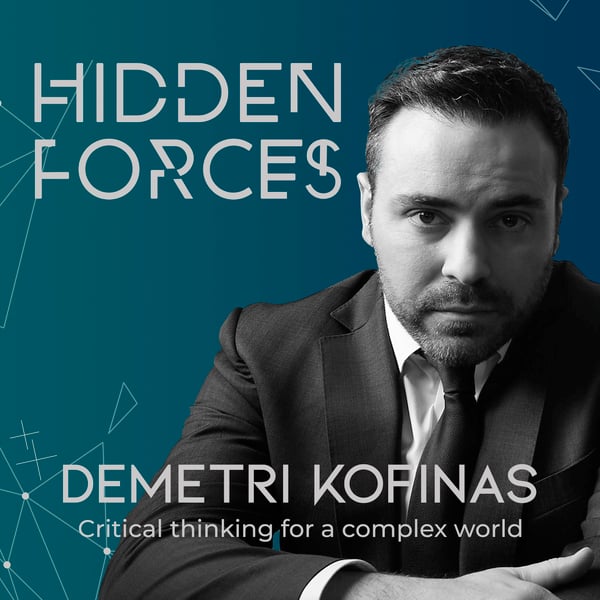What Pre-WWII France Can Tell Us About America in 2023 | Jonathan Kirshner
Hidden Forces
Demetri Kofinas
4.8 • 1.6K Ratings
🗓️ 20 February 2023
⏱️ 55 minutes
🧾️ Download transcript
Summary
In Episode 298 of Hidden Forces, Demetri Kofinas speaks with Professor of Political Science and International Studies at Boston College, Jonathan Kirshner. Dr. Kirshner belongs to the school of international relations known as “classical realism,” which places a unique emphasis on the role played by uncertainty and the need to grapple more seriously with the nuance of historical context, the governing ideologies and perspectives of different states, the quality of leadership, and the character and harmony of a nation’s people.
Demetri and Jonathan spend the first hour of their conversation applying the framework of analysis that Kirshner puts forward in his latest book “An Unwritten Future” toward three distinct historical conflicts: the Peloponnesian war, the war in Vietnam, and the 2003 US invasion of Iraq. All three of these wars had ruinous consequences for the aggressor state. In the case of the Iraq war, the conflict badly damaged public perceptions of (and trust in) the competency of America’s foreign policy elite, the credibility of its press, and the state of its finances.
The legacy of the Iraq war, as well as the prolonged occupation of Afghanistan and the consequences of the 2008 financial crisis, are the subjects of the episode’s second hour. In it, Demetri and Jonathan compare the divisions present within contemporary American society to those present within the Third French Republic in the years leading up to its stunning defeat and subsequent collaboration with Nazi Germany. What was it about French society that made it so susceptible to co-optation and what lessons can we draw from the French experience when devising public policy meant to serve the national interest?
The goal of today’s conversation is to help advance a framework that partially explains the divisions currently present in American society so that we can advocate more thoughtfully for solutions that heal our national wounds by bringing our citizens closer together rather than pushing each other further apart. Demetri believes strongly that this healing is necessary and that it will require putting the national interest ahead of our own more immediate material concerns.
You can subscribe to our premium content and gain access to our premium feed, episode transcripts, and Key Takeaway at HiddenForces.io/subscribe.
If you want to join in on the conversation and become a member of the Hidden Forces genius community, which includes Q&A calls with guests, access to special research and analysis, in-person events, and dinners, you can also do that on our subscriber page. If you still have questions, feel free to email [email protected], and Demetri or someone else from our team will get right back to you.
If you enjoyed listening to today’s episode of Hidden Forces you can help support the show by doing the following:
Subscribe on Apple Podcasts | YouTube | Spotify | Stitcher | SoundCloud | CastBox | RSS Feed
Write us a review on Apple Podcasts & Spotify
Subscribe to our mailing list at https://hiddenforces.io/newsletter/
Producer & Host: Demetri Kofinas
Editor & Engineer: Stylianos Nicolaou
Subscribe & Support the Podcast at https://hiddenforces.io
Join the conversation on Facebook, Instagram, and Twitter at @hiddenforcespod
Follow Demetri on Twitter at @Kofinas
Episode Recorded on 02/13/2023
Transcript
Click on a timestamp to play from that location
| 0:00.0 | What's up everybody? My name is Demetra Carfinas and you're listening to Hidden Forces, |
| 0:06.0 | a podcast that inspires investors, entrepreneurs and everyday citizens to challenge consensus |
| 0:13.0 | narratives and to learn how to think critically about the systems of power shaping our world. |
| 0:18.0 | My guest in today's episode is Professor of Political Science and International Studies |
| 0:23.0 | at Boston College, Jonathan Kirschner. Jonathan is the author of a phenomenal new book |
| 0:29.0 | on the subject of classical realism, titled Unwritten Future, |
| 0:34.0 | which emphasizes the role played by uncertainty and the need to grapple more seriously |
| 0:39.0 | with the nuance of historical context, the governing ideologies and perspectives |
| 0:44.0 | of different states in the international system, the quality of leadership, |
| 0:48.0 | and I would argue most importantly, the character and harmony of a nation's people. |
| 0:53.0 | We spend the first hour of our conversation applying this framework of analysis |
| 0:58.0 | to three distinct historical conflicts, the Peloponnesian War, the Warren Vietnam, |
| 1:03.0 | and the 2003 U.S. invasion of Iraq, all of which had ruinous consequences |
| 1:08.0 | for the aggressor state and in the case of the Iraq war, badly damaged public perceptions |
| 1:13.0 | of and trust in the competency of America's foreign policy elite, |
| 1:18.0 | the credibility of its press and the state of its finances. |
| 1:22.0 | The legacy of this war, as well as the prolonged occupation of Afghanistan |
| 1:26.0 | and the 2008 financial crisis and its aftermath are the subjects of the episode's second hour, |
| 1:32.0 | where we compare the division's present within contemporary American society |
| 1:36.0 | with those of the third French Republic in the years leading up to its stunning defeat |
| 1:41.0 | and subsequent collaboration with Nazi Germany. |
| 1:45.0 | What was it about French society that made it so susceptible to co-option? |
... |
Please login to see the full transcript.
Disclaimer: The podcast and artwork embedded on this page are from Demetri Kofinas, and are the property of its owner and not affiliated with or endorsed by Tapesearch.
Generated transcripts are the property of Demetri Kofinas and are distributed freely under the Fair Use doctrine. Transcripts generated by Tapesearch are not guaranteed to be accurate.
Copyright © Tapesearch 2025.

